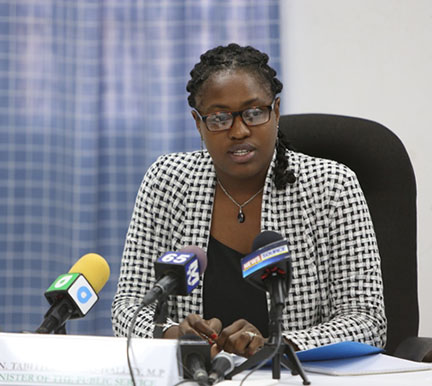Public servants who access government loans to pursue higher education at the University of Guyana (UG) should have their balances written off after giving five years post-graduation service in the public sector, says executive member of the Working Peoples Alliance (WPA) Tabitha Sarabo-Halley.
Sarabo-Halley, who currently serves as Minister of Public Service, and has charge of the government’s scholarship programme, said that she will be insisting that it be added to the manifesto of A Partnership for National Unity (APNU) in the coming elections. She made the comments during an WPA press conference yesterday afternoon at Rodney House.
Under the APNU+AFC coalition government, the volume and variety of scholarship opportunities to study at UG and beyond have increased.
Just recently, four prospective graduates from UG’s Department of Law were granted full scholarships to read for their Legal Education Certificates at the Hugh Wooding Law School in Trinidad.
The increase in available scholarships is said to be partially responsible for the enrollment of a record 4,000 students at UG for the 2019/2020 academic year, which said to be the highest to date. Sarabo-Halley also suggested that the increase in enrollment is a response to government’s continued encouragement to persons to seek higher education. However, there is no data to verify the assertion.
Sarabo-Halley said that another goal of this initiative would be to incentivise public servants to enhance their professional profiles.
Currently, the government makes loans available for persons looking to study a wide cross-section of courses at UG through the Student Loan Fund, which is a revolving fund, financed by repayment of substantive loan sums, and interest. In essence, funds lent from the funds, and repaid with interest, are used to finance the studies of students who come after.
Cash Advances
Meanwhile, fellow WPA executive member Dr David Hinds reiterated the party’s commitment to advocating for cash advances for citizens which would be financed from revenue Guyana anticipates from its petroleum sector. He said that they will be pushing for this initiative to be included in APNU’s manifesto.
The WPA will continue to bring this proposal to the table, he said, because it is an initiative that will benefit the poor. He also cited its popularity among the Guyanese populace.
The idea of cash transfers to households in Guyana, initially floated by economist and fellow WPA member Professor Clive Thomas, has received support from the Alliance For Change, but Foreign Secretary of the Ministry of Foreign Affairs Carl Greenidge had indicated that government might not approve.
Thomas, however, has maintained that it is unlikely that Guyana’s oil wealth will trickle down to the poorest, and said that cash transfers is the only way of ensuring that they receive a share.

